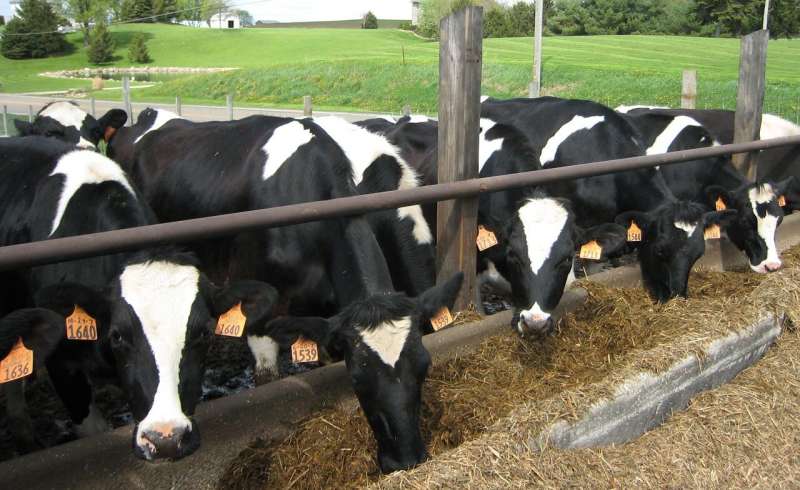This article has been reviewed according to Science X's editorial process and policies. Editors have highlighted the following attributes while ensuring the content's credibility:
fact-checked
trusted source
proofread
Q&A: Ethical approaches to mitigate H5N1 bird flu

In recent months, H5N1 or HPAI (highly pathogenic avian influenza), commonly referred to as bird flu, has become a growing concern for public health authorities. Mitigation efforts, including surveillance and testing of livestock populations, were increased after two human cases of H5N1 in the U.S. were identified in dairy farm workers, but how do we determine which interventions would be most ethical?
Maxwell Smith is a health studies professor and Western's first Canadian Institutes of Health Research Chair in Applied Public Health. He studies the ethical dimensions of responding to infectious diseases and spoke with Western News about some of the ethical concerns around mitigating the impact of H5N1.
Western News: What are the main ethical concerns around managing H5N1/HPAI?
Maxwell Smith: There are unique ethical issues regarding the efforts used to prevent an outbreak in humans. For example, when is it justified to require the testing of livestock, to restrict livestock and livestock products across borders or cull animals? These measures could help prevent transmission of H5N1, but they come with costs that are often borne by farmers and the agriculture industry. This creates challenging ethical questions about the right course of action.
There are also important ethical issues surrounding preparedness. Lack of sufficient surveillance and vaccine manufacturing or procurement may mean we will be caught off-guard if there is an outbreak. Being ill-prepared often means having to make more difficult decisions later.
What lessons did we learn from COVID-19?
The COVID-19 pandemic brought up ethical questions including how to fairly allocate scarce resources like vaccines and masks, when to use non-pharmaceutical interventions like physical distancing, school closures and border restrictions, and whether vaccination and masking should be made mandatory. I worry we are no better prepared to navigate these ethical issues today. This is largely because we've failed to have a societal conversation about the ethical dimensions of those measures.
I think we've identified lessons, but I'm not so sure we've learned them. In my view, the most significant lessons are ethical lessons, for example, what we owe to one another when facing a threat to the public's health. The answer serves as the foundation to our views about a host of different ethical questions during COVID-19 and future pandemics.
What are you watching in efforts to prevent the spread of H5N1/HPAI?
Most concerning right now are reports that some farmers, the broader agriculture industry, and even states are pushing back against attempts to track and mitigate the spread of H5N1 in livestock. Their concerns are important: testing livestock can have economic implications if there are positive tests. Without government assistance, reluctance to collaborate with health authorities is understandable.
An important ethical challenge we're facing is navigating when it is justified for government authorities to require testing or restrict the sale or transport of livestock, what the penalties should be for noncompliance and how to mitigate the unintended consequences of such measures on the livelihoods of farmers and the agriculture industry. Success is dependent on getting these ethical questions right.
Are there ethical concerns around virus surveillance efforts?
There's a clear ethical concern with lack of surveillance. We expect governments to protect us from threats, but they can't do that effectively if they don't have any information about those threats. Inadequate surveillance can lead to illness and death that could otherwise have been prevented.
However, increased surveillance also presents ethical issues, including interference with our privacy. The question is how much intrusion of our privacy is justified to protect one another from harm? Surveillance can also generate information that may lead to interventions being taken and those actions can have negative impacts on people.
How do we decide when an intervention is ethical?
Because ethics is about the values that underpin our choices around what is considered "right" and "wrong," its important to consider the values—what we consider to be important—of the people impacted by public health interventions.
But it doesn't stop there. We also need to engage in explicit ethical reasoning to justify decisions. This involves identifying and developing ethical arguments for and against interventions. Then, we must evaluate those arguments for coherence, soundness and alignment with values we consider to be important, like equity, protecting the public from harm and individual liberty.
What role does medical information about health threats play in determining course of action?
Medical information is necessary but not sufficient to inform acceptable strategies for public health responses to threats. This is because we are all willing to accept varying degrees of risk in our lives. Medical information can characterize what is good and bad for our health, but it can't straightforwardly tell us what to do with that information. For that, we need to make value judgments, which require ethics.
We often need to make decisions in the absence of evidence, especially during public health crises like pandemics. This includes decisions to act or not to act. Any decision comes with the risk of being wrong. Without evidence informing us of what that risk is, we need to make value judgments about what level of risk is acceptable. This is an ethical issue and so requires ethics to help inform the "right" decision.



















